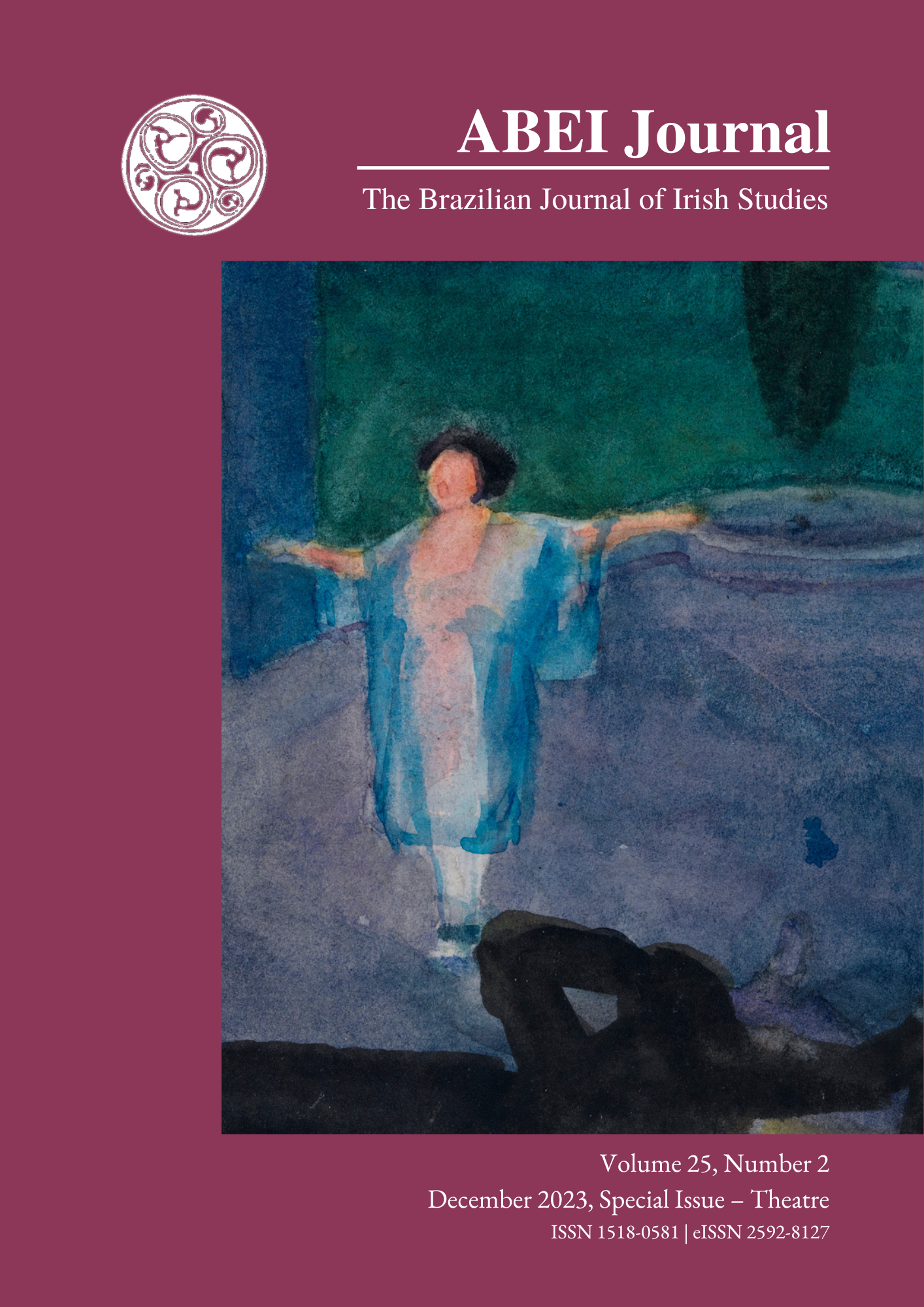Woman Undone de Brokentalkers: Ativismo com uma diferença
DOI:
https://doi.org/10.11606/issn.2595-8127.v25i2p101-117Palavras-chave:
Pós-dramático, Gênero, Patriarcado, Trauma corporificadoResumo
A companhia de teatro Brokentalkers, criada pela primeira vez em 2001, pode ser descrita como uma organização destemida e inovadora que, desde o início, tentou equilibrar as desigualdades prevalecentes na sociedade irlandesa. É composto por Feidhlim Cannon e Gary Keegan, que descrevem o seu espírito de conceber performances ao vivo originais e acessíveis e explorar novas formas que desafiam as ideologias tradicionais do teatro baseado em texto. Eles usam o meio pós-dramático para transmitir a urgência de uma situação particular e, em linha com isso, suas performances podem muitas vezes incluir pastelão, ação física violenta, culturas pop, quebra de ilusão e explosões histéricas dos atores. Uma de suas apresentações mais recentes, Woman Undone, que estreou em 2018, é uma impactante reimaginação e reconstrução de um aspecto da vida da cantora de blues Mary Coughlan. Este ensaio investiga o uso de estratégias dramatúrgicas como musicalidade, movimento corporal e elenco de gênero cruzado na performance, a fim de destacar a situação daqueles que foram abusados na Irlanda. O microcosmo da experiência de uma mulher conhecida é trazido para o macrocosmo da sociedade para educar e esclarecer todas as mulheres.
Referências
Bamber, Helen. The good listener. Wiedenfeld and Nicolson. 1998.
Bardet, Marie. Philosophy of bodies in motion: between improvisation in dance and Bergson’s philosophy: study of immediacy. Diss. Paris 8, 2008.
Beck Julian, The Life of the Theatre (San Francisco: City Lights Books, 1972), No.84.
Carlson, Marvin. 2015. Postdramatic Theatre and Postdramatic Performance. Revista Brasileira de Estudos da Presença 5: 2015. 577–95.
Chappel, Freda, and Chiel Kattenbelt. “Key issues in intermediality in theatre
and performance” Intermediality in theatre and performance. Brill, 2006. 11-25.
Chung, Rachel. “Come, Sir Boy: Subverting Masculinity Through Cross-Gender Performance.” Inquiries Journal 9.11 (2017).
Coughlan, Mary. Bloody Mary My Story. Dublin: HachetteBooks,2009.
Etchells, Tim. Certain fragments: Contemporary performance and forced entertainment. Psychology Press, 1999.
Ferriter, Diarmaid. The transformation of Ireland 1900-2000. Profile Books, 2010.
Filipas, Henrietta H., and Sarah E. Ullman. “Child sexual abuse, coping responses, self-blame, posttraumatic stress disorder, and adult sexual revictimization.” Journal of Interpersonal Violence 21.5 (2006): 652-672.
Fischer-Lichte, Erika. The transformative power of performance: a new aesthetics. Routledge, 2008.
Freebody, Kelly, and Michael Finneran. Critical themes in drama: Social, cultural and political analysis. Routledge, 2021.
Freire, Paulo. Pedagogy of indignation. Routledge, 2015.
Fuchs, Georg. Der Tanz, Stuttgart: Verlag von Strecker & Schroeder, 1906.
Garvin, Tom. Preventing the future: Why was Ireland so poor for so long? Dublin:Gill & Macmillan Ltd, 2004.
Giroux, Henry A. Disposable youth: Racialized memories, and the culture of cruelty. Routledge, 2012.
Hawton, Keith, Kate EA Saunders, and Rory C. O’Connor. “Self-harm and suicide in adolescents.” The Lancet 379.9834 (2012): 2373-2382.
James, Allan. “Linguistic layering and the play semiotics of postdramatic (and dramatic) theatre.” AAA: Arbeiten aus Anglistik und Amerikanistik 45.2 (2020).
Klett, Elizabeth. “Re-Dresssing the Balance”. Ed. James Bulman. Shakespeare Re-Dressed: Cross-Gender Casting in Contemporary Performance. Cranbury, New Jersey: Rosemont Publishing and Printing Corp, 2008. 166-188. Print.
Lehmann, Hans-Thies. ““Postdramatic Theatre”, a decade later.” Dramatic and Postdramatic Theater Ten Years After: Conference Proceedings. Belgrade: Faculty of Dramatic Arts, 2011.
McMullan, Anna. Performing embodiment in Samuel Beckett’s drama. Routledge, 2020.
Miller, Gemma. “Cross-gender casting as feminist interventions in the staging of early modern plays.” Journal of International Women’s Studies 16.1 (2014): 4-17.
Oh, Chuyun. ““Can you dance for me?” the (Im) possibility of speaking trauma in dance ethnography.” Text and Performance Quarterly 41.3-4 (2021): 241-261.
States, Bert O. “The phenomenological attitude.” Critical theory and performance (1992): 369-79.
Pine, Emilie. “Introduction: Moving Memory.” Irish University Review 47.1 (2017): 1-6.
Pine, Emilie. The memory marketplace: Witnessing pain in contemporary Irish and international theatre. Bloomington: Indiana University Press, 2020.
Rhodes, Karin V., et al. ““You’re not a victim of domestic violence, are you?” Provider–patient communication about domestic violence.” Annals of Internal Medicine 147.9 (2007): 620-627.
Solomon Alisa. Re-Dressing the Canon: Essays on Theater and Gender. London: Routledge 1997.
Vicary, Judith R., Linda R. Klingaman, and William L. Harkness. “Risk factors associated with date rape and sexual assault of adolescent girls.” Journal of adolescence 18.3 (1995): 289-30.
Walsh, Fintan, and Willie White, eds. That Was Us: Contemporary Irish Theatre and Performance. Bloomsbury Publishing, 2013.
Weygandt, Susanna. “Revisiting skaz in Ivan Vyrypaev’s cinema and theatre: rhythms and sounds of postdramatic rap.” Studies in Russian and Soviet Cinema 12.3 (2018): 195-214.
Wright, Colin. “Lacan on Trauma and Causality: A Psychoanalytic Critique of Post-Traumatic Stress/Growth.” Journal of Medical Humanities 42.2 (2021): 235-244.
Willcoxon, Jeanne. “Postdramatic Theatre.” Theatre Topics 18.2 (2008): 248-249.
Woman Undone By Brokentalkers. Directors Feihlim Cannon and Gary Keegan. Project Arts Theatre. Attended 16/11/2018.
https://www.auroranova.org/ Accessed 25/05/2023.
https://www.drcc.ie/news-resources/research-shows-most-people-believe-ireland-has-problem-with/ Accessed 25/05/2023.
https://www.hotpress.com/culture/mongoose-pitfalls-industry-crowdfunding-stunning-new-album-22782801 Lucy O’Toole. Accessed 25/05/2023.
https://www.independent.ie/opinion/comment/keep-the-spotlight-on-dark-corners-of-our-past/42193534.html Colin Murphy. Accessed 26/05/2023.
https://www.irishtimes.com/life-and-style/people/mary-coughlan-32-times-i-ended-up-in-hospital-with-alcohol-poisoning- Patrick Freyne. Accessed 25/05/2023.
https://nctheatre.com/blog/women-theatre-historical-look Accessed 25/05/2023.
https://wildfirefilms.net/films/druid-shakespeare/ Accessed 25/05/2023.
https://vimeo.com/335430804 Woman Undone by Brokentalkers. Accessed 31/05/2023.
The Works Presents - Louise O’Neill | RTÉ - YouTube
Downloads
Publicado
Edição
Seção
Licença
Copyright (c) 2023 Helena Young

Este trabalho está licenciado sob uma licença Creative Commons Attribution-NonCommercial 4.0 International License.


